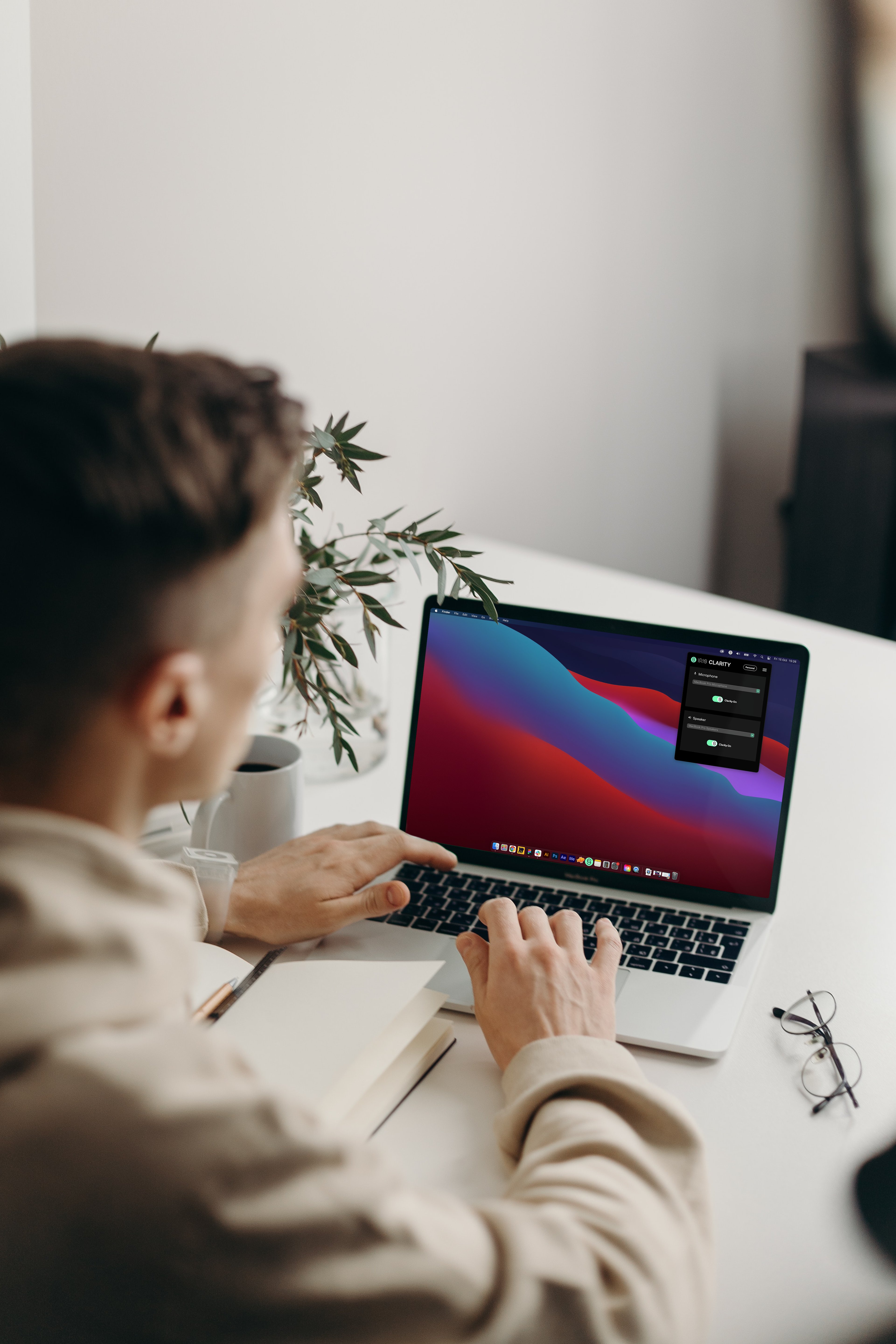The Impact of Workplace Noise: Bring control to uncontrollable environments
The pandemic has forced a change in almost every aspect of life and there has been a global shift towards virtual working, with an increase in hours spent on video and online calls.
Platforms such as Zoom, Teams, and Google Meet have revolutionised our ability to work remotely, but we often find ourselves working in environments that are not fit for purpose.

Background noise can be beyond our control, from other colleagues’ sales calls, music choices and cross-office chat, to road noise, children playing, or dogs barking whilst working remotely.
These sounds in our personal and professional spaces not only affect productivity but can also have a huge impact on our health and wellbeing.
Director of Music at IRIS Audio Technologies, Rob Macfarlane, suggests a few simple changes we can make to show our ears a little love and to restore some focus whilst working.
The Power — And Peril — Of Sound
As a fifteen year old growing up in Plymouth, I’d been an absolute metal-loving, hair-colouring, colour-eschewing, unashamed goth kid, and London’s Camden was my mecca.
Unlike the fish and domestic goods market stalls of Plymouth, Camden was the one-stop shop for band merchandise, bootleg concert DVDs and chunky Doc Martens.
No bad open mic nights here, only great concerts by great bands seemingly every night of the week. Camden’s distance and inaccessibility no doubt added to the mystique it held in my fifteen year old mind - like some far-off Valhalla where everyone lived the culture I loved.
Cut to January 2020, and having spent fifteen years clawing my way up the ladder of the recording industry, I was viewing my dream flat; a one bed with a view of the Camden Town tube station from its living room.
Moving during the midst of a pandemic wasn’t ideal, but it had provided a rental market suitably depressed that I could afford this little slice of heaven. I excitedly agreed with the agent, and barely noticed the three large windows facing the high street. All were single-glazed.
I’m now looking for a new flat, and not one within walking distance of Camden Market. As the lockdowns eased, the traffic resumed, and the nightlife re-opened, I suddenly saw the fatal flaw in my little Camden flat.
If a busker plays anywhere within a quarter-mile of the flat, I can hear them so clearly I instinctively reach for change in my pocket. The ambulances come around three times an hour and reach a sufficient volume to make me wince every time.
The effect on my mental well-being has been hard to overstate; researching stats for this article have only reinforced the need for me to get out of there, as fast as possible.
Noise Pollution In Numbers
What if I told you that your stress levels, your ability to concentrate, your productivity and even your sales targets - even your posture - were all being negatively impacted by something you’ve probably barely even noticed before now?
Noise pollution has become a major problem in cities around the world. Whilst there has for decades been a focus on the overall macro-level of noise that our urban lifestyles create, it’s now becoming more apparent that the noise in our personal and professional spaces is a threat to our health and wellbeing.
Current research on noise pollution
A 2011 study across six European cities found that just an extra 10 decibels of environmental noise were associated with a huge 28% increase in the use of anxiety medication.
In his TEDX talk on sound, Julian Treasure states that offices suffering from a noisy sound environment can exhibit a 66% drop in measurable productivity, with sales environments making a shocking 28% loss in sales revenue.
In this article, I hope to lay out the various ways in which not only our mental well-being but our physical health is affected by noise pollution and poorly managed sonic environments; and what we can hope to do to recover some of this stolen productivity.
There are some simple changes we can make to our daily habits once we’re aware of the problem and show our ears a little care.
The Problem With Constant Exposure To Noise
Take a moment to pause and count the sounds around you.
Whether it’s the traffic outside, your colleagues chatting, the hum of an air conditioner or fridge, tuning out each of these noises adds to the mental workload you have to shoulder throughout your day.
Busy sales floors are an obvious culprit, but even working from home can be a surprisingly poor aural environment; a constantly running TV, a barking dog, or simply the usual hubbub of a busy home.
Your auditory system is constantly open - unlike our eyes, we have no biological way of closing our ears. You are always processing whatever noises you happen to be within earshot of, whether you want to be or not.
How noise contributes to stress
According to Thomas Munzel, a cardiologist at the Johannes Gutenberg University in Germany, noise triggers our instinctual flight or fight response.
Noise makes the part of the brain responsible for emotional processing send a series of signals to our adrenal system, flooding the body with adrenaline and cortisol.
This is part of a hard-wired evolutionary response to danger and not something that we want to be triggering on a daily, or hourly basis. Over time, the constant state of alert begins to take its toll.
Why noise affects our health
When the brain is constantly exposed to this low, subconscious level of noise-induced cortisol our ability to focus takes a permanent hit, and our bodies exhibit a physiological stress response that can manifest as depression, anxiety, poor sleep, even increased risk of heart complications and a lowered immune system.
A 2017 conference paper found that this constancy of noise pollution can contribute to nausea, headaches, emotional instability, neurosis and in extreme cases, even exacerbate issues as severe as psychosis. The same paper states that “a lack of perceived control” over the noise intensifies these effects on our mental health.
The workplace is by definition one of the main spaces where noise can be beyond our control; we don’t get to define the soundscape we experience. The necessary compromises we make with one another’s sales calls, music choices, foot-tapping and cross-office chat are just the tip of the iceberg when it comes to workplace noise pollution.
How To Gain Control Of Noise in Uncontrollable Environments

Much like any battle, being aware of the problem is half of the solution. Over the next few days, keep a brief mental note of what times and places in your working life are particularly noisy and which provide a little sanctuary.
This can contribute to your decision-making about when to take important sales calls or where to read hefty documents to best manage your stress levels. You’ll be surprised at the difference even a few metres of distance from a noise can make, or the volume of certain hours in the office compared to others.
If you have the luxury of a physical door, you can keep it closed during busier times of the day, but for most of us, this isn’t possible where we work.
The solution is to stay mobile - don’t be afraid to take a short walk to a different environment, even if it’s just ten minutes in the kitchen to grab a cup of tea. This is a minor change but has a huge effect on your perceived ability to control your audio diet. If it gets too much, you can just walk away.
Probably your biggest ally is a good set of headphones to block out the hubbub around you.
Here you can turn sound into an ally by curating exactly what you’re listening to instead of the sales floor - birdsong is proven to calm and relax us at any time of the day, without being a source of distraction. Music too is one of the most powerful emotional modulators available to us, and should never be overlooked as a means of de-stressing.
How to eliminate background noise from your calls
Your sales calls and remote meetings represent a huge percentage of your audio diet whilst at work, and anything you can do to improve them will be a huge help to your stress levels.
When it comes to the background noise and distractions present on your calls, there are tools available for dealing with this too - at IRIS we provide exactly that.
IRIS Clarity is a voice isolation software that eradicates background noise to make online meetings vastly more effective. The simple software solution utilises AI to remove unwanted background noise and interference from both sides of audio calls and video conferencing, in even the most demanding of environments. IRIS Clarity works across all of the most common online meeting applications and VoIP platforms, allowing all to experience the benefits of clearer audio without distractions.
And perhaps most importantly, realise that you are most likely not alone; if you have a problem with the noise levels of your office, it’s almost certain many of your colleagues do too!
Don’t be afraid to flag it as an issue with your team so that you can all collaboratively work towards lowering the volume levels throughout the day.
It’s an entirely different way of feeling throughout your workday when your ears are looked after. Why wait any longer to find out?
About IRIS:
IRIS is a revolutionary audio technology company with a mission to enable the world to Listen Well. Its suite of patented products leverages decades of research into the effects of sound on the brain, prioritising focus, productivity, and wellness for all. By harnessing the science of sound, IRIS dramatically improves how people experience audio across all digital platforms, from video meetings to streaming, podcasts to audiobooks.
